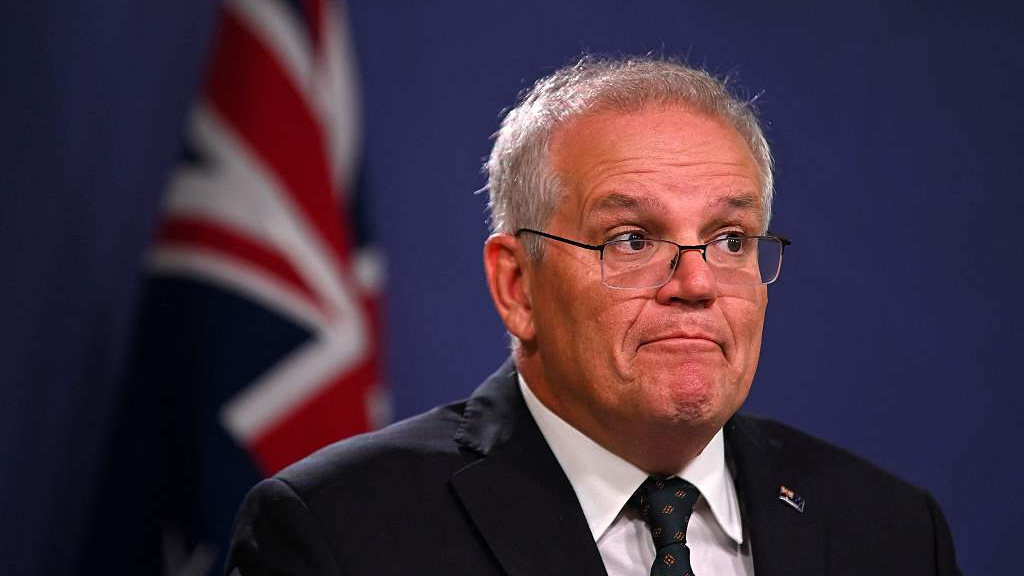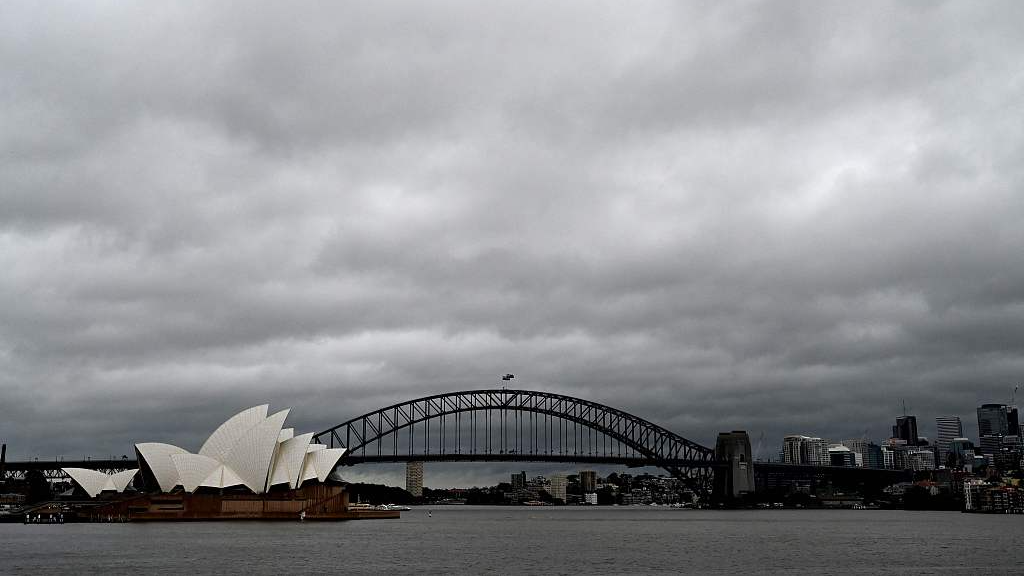
Australian Prime Minister Scott Morrison speaks to the media during a press conference in Sydney, February 23, 2022. /VCG
Australian Prime Minister Scott Morrison speaks to the media during a press conference in Sydney, February 23, 2022. /VCG
Editor's note: Daryl Guppy is an international financial technical analysis expert. He has provided weekly Shanghai Index analysis for media for the Chinese mainland for more than a decade. Guppy appears regularly on CNBC Asia and is known as "The Chart Man." He is a national board member of the Australia China Business Council. The article reflects the author's opinions and not necessarily those of CGTN.
The Australian prime minster refused an invitation to meet with the new Chinese ambassador to Australia. In explaining his decision, he described the rebuff as "entirely proportional" to action taken by China in relation to Australia. He failed to acknowledge the olive branch offered by this meeting, seemingly happy with the continuation of frosty relations.
This response from the Australian prime minister echoed the stance from Marise Payne, the minister for foreign affairs, following her meeting with the Chinese ambassador. Both the Morrison government and experts were quick to caution that the meeting should not be regarded as a thaw in the relationship.
This makes it a microcosm of the current Australia-China relationship, where Australia shows an unwillingness to move forward unless certain conditions are met. It is an inappropriate stance based on a deliberately manufactured falsehood about the so-called "14 demands" made by China in 2020 in an untitled briefing note.
As a former ambassador to China, Geoff Raby, noted at the time, they were nothing of the sort. Calling the briefing note "14 demands" remains a deliberate misrepresentation of both the event and the purpose but it has locked Australia into an uncompromising position that has more to do with bullheadedness than sovereignty.
In diplomatic terms, formal demands by one country to another are presented as a demarche and carry specific consequences and meaning. The information produced by the Chinese embassy was a background briefing note of 14 issues that China was concerned about in terms of Australia-China relations.
Deputy Head of Mission in the Chinese Embassy Wang Xining explained that "the Embassy official was offered an opportunity to explain why our relationship is not in good shape, so she tried to enumerate certain points that your government and my government don't agree upon." These were dot-point briefing observations on what China believed was creating friction in the bilateral relationship. The untitled list made no demand that these issues be addressed as a condition of continuing the Australia China relationship and as such was not an attack on Australian sovereignty.

Storm clouds move over the Sydney Harbour Bridge and Opera House in Sydney, Australia, March 8, 2022. /VCG
Storm clouds move over the Sydney Harbour Bridge and Opera House in Sydney, Australia, March 8, 2022. /VCG
This briefing note was an untitled list which an embassy official handed to Jonathan Kearsley, a federal political reporter at 9News, during a meeting at the Hyatt Hotel in Canberra in 2021. It was not issued as a formal document by the embassy for delivery to the Australian foreign minister and as such, has no diplomatic status.
There is no question that this "demand" interpretation was created purely for short-term political purposes by anti-China forces within the Australian political leadership. It was a willful distortion designed to appeal to anti-China segments of the Australian electorate. Australia has reveled in its pretense that the briefing note was the equivalent of a demarche and pushed the false idea that it threatened Australian sovereignty.
Unfortunately, the Australian political leadership has (mis)treated this background briefing note as if it was a formal diplomatic note. Never mind that this was a convenient fiction created by a small group of politicians and promoted by groups like the foreign-funded Australian Strategic Policy Institute and the Murdoch media.
Australians have been loud, and undiplomatic, in their demands of what China should or should not do in terms of the Australia-China relationship and other matters, including Hong Kong. These are clearly an attack on Chinese sovereignty but the double standards entailed in this approach do not seem to prick the moral or ethical conscience of these politicians and media commentators.
How to re-establish cordial relationships between the two countries is a difficult question. Conversation is a must because without conversation there can be no understanding. Conversation will include issues of disagreement as this is normal in the relations between two countries. Conversation is the purpose of diplomacy. Conversation means misunderstandings do not grow into misfortune.
It's a difficult matter of face for either side to accept conditions demanded prior to opening any conversation. Australia's continued characterization of the briefing note as 14 demands that must be renounced before conversation can begin makes it very difficult to begin the process.
China sees no need to do this because the untitled briefing note does not have the status of a demarche. As such, China will not accept renouncement of the concerns in the briefing note as a precondition for conversation or dialogue.
Australia has painted itself into an uncomfortable corner with dogged adherence to the false characterization of talking points as a list of "demands."
Perhaps paving the way for a solution comes from conversations initiated at a second level, led by business organizations like the Australia China Business Council and counterparts in China Council for the Promotion of International Trade.
One thing is certain: China is less likely to respond positively to attempts to initiate conversations at senior political levels in the face of continued loud vilification.
(If you want to contribute and have specific expertise, please contact us at opinions@cgtn.com. Follow @thouse_opinions on Twitter to discover the latest commentaries in the CGTN Opinion Section.)

